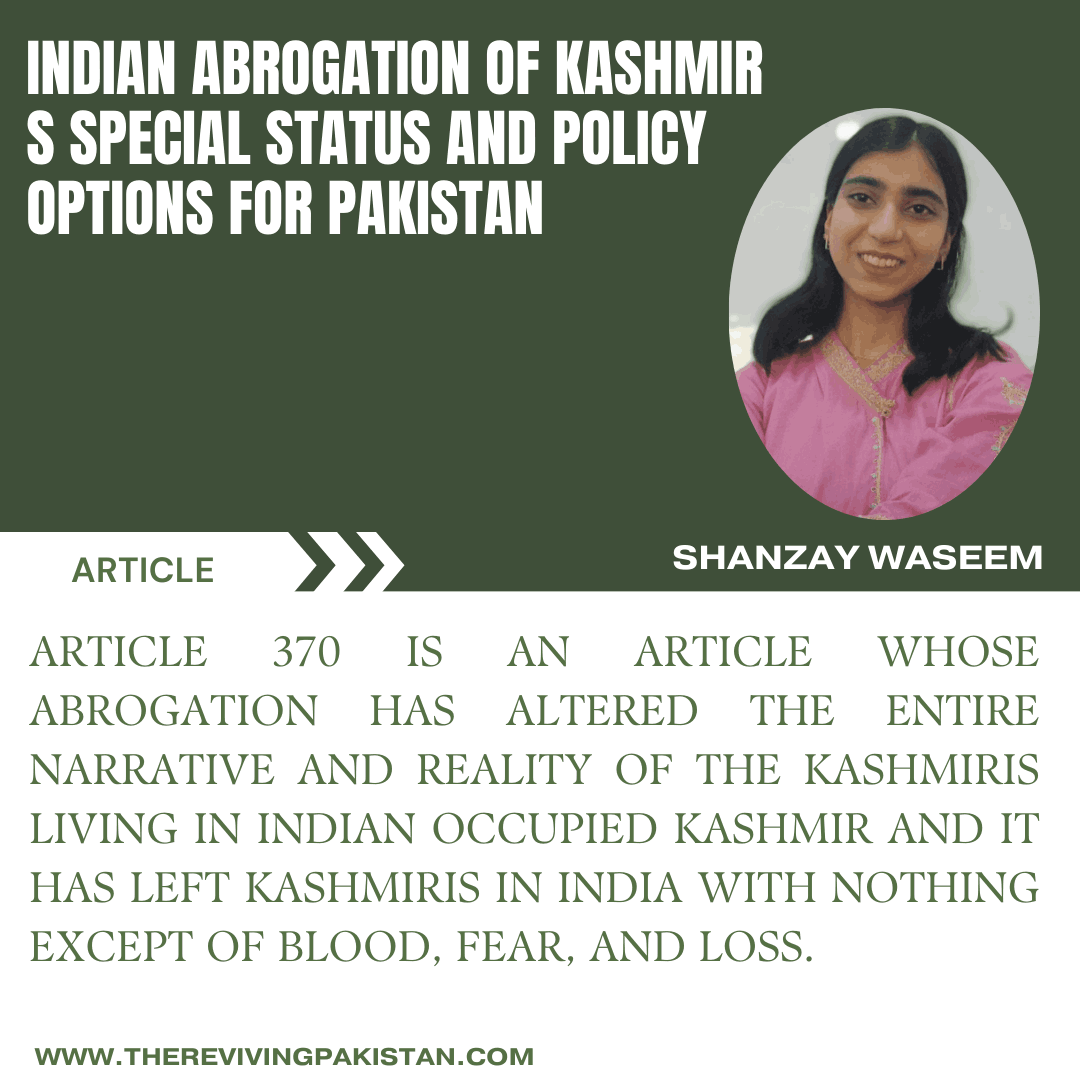About the Author(s)

Shanzay Waseem
The author is a student currently pursuing her bachelor’s in Strategic Studies from the National Defense University, Islamabad. She has a keen interest in and has been doing my research on geopolitics, homeland security objectives, and intra-state and interstate security issues.
Introduction:
Article 370 is an article whose abrogation has altered the entire narrative and reality of the Kashmiris living in Indian-occupied Kashmir, and it has left Kashmiris in India with nothing except blood, fear, and loss. To introduce it, Article 370 came into effect after India’s former defense minister N. GOPALASWAMI AYYANGAR introduced it according to which it granted Jammu and Kashmir autonomy in internal matters of Kashmir except the matters of defense, foreign affairs and communications as stated in the instruments of the accession. Jammu and Kashmir had the right to have its own flag, prime minister, president, and its constituent assembly. Article 370 was made in such a manner that the autonomy of Jammu and Kashmir would also prevail and some provisions from India’s constitution would integrate on Jammu and Kashmir.
Jammu and Kashmir’s minister’s statements over article 370:
Former chief- minister of Jammu and Kashmir Mehbooba Mufti said in her own wording that ‘I assure people of Jammu and Kashmir that they will be staying a part of India under certain conditions. And article 370 guarantees those conditions and no power on earth can take away article 370 from the people of Jammu and Kashmir state’. If any law from the constitution of India needs to be imposed on the state of Jammu and Kashmir, it can be imposed but a presidential order should be issued only after the government of Jammu and Kashmir gives approval. And if the article 370 has to be removed the approval from Jammu and Kashmir s constituent assembly and state government is required. Then they both would give the approval, afterwards the President of India would pass a presidential order and after that article 370 would be removed.
The articulate problem over removing article 370 and inclusion of Article 35 A:
The problem in removing article 370 was that the constituent assembly that had created the constitution of Jammu and Kashmir dissolved on January 26,1957 and when the constituent assembly existed no more, then how would the approval for article 370 s abrogation come. And because of this reason Kashmir s leader used to confidently say that article 370 can never be removed. Article 35 A was included in article 370 through the presidential orders given by President Rajendra Prasad under the constitution of India, article 35 -A was quite similar to state subject 1927 that demarcated permanent residents with exclusive right to purchase land, seek State government and other benefits in education and healthcare.
Real politics was played by BJP:
Bharatiya Janata Party (BJP) had always been against the special status given to Jammu and Kashmir and even in their election manifestos they said that special status of Jammu and Kashmir will be abrogated. As BJP’s leaders have always been of the view that in one country, two flags and two prime ministers cannot be retained. Therefore, BJP joined hands with PDP (People s Democratic Party) in forming the government in the 2014-15 Jammu and Kashmir s legislative elections. On 19 June,2018 when BJP suddenly took its support back from PDP, there was no government left behind and according to Jammu and Kashmir’s constitutions article NO.92 in the absence of Jammu and Kashmir’s government, president rule will not be directly applied; however, for 6 months’ governor will run Jammu and Kashmir. Satyapal Malik who belongs to BJP was appointed as the governor of Jammu and Kashmir and after a recommendation letter was sent by him to the central government that government should not be formed in Jammu and Kashmir because of chances of horse-trading between MLA s as opposition parties were trying to collectively form a government in Jammu and Kashmir, therefore the letter gets accepted and on 20 December,2018 presidents’ rule was applied on Jammu and Kashmir.
THE DAY WHEN THE FATE OF KASHMIRIS IN INDIA CHANGED=
5 August 2019 was the day when Article 370 was revoked, and the resolution to remove Article 370 was presented by Union Home Minister Amit Shah, after which now Kashmir is no longer an autonomous state in India. BJP and its leaders were overjoyed over their accomplishments and celebrated with pride. Union home minister in his speech to the lok sabha (Indian parliament) stated that article 370 was ‘mistake done by Nehru and that today article 370 has been scrapped from the pages of history.”
On the other hand, Pakistan’s foreign office strongly condemned this action taken by the Indian government and labeled it as an illegal and unilateral action taken by the Indian government as it violated the UN resolutions. Pakistan’s army chief also stated that the Pakistan army has always stood with the people of Kashmir and will extend their support to them. The National Security Committee also decided to downgrade Pakistan’s diplomatic relations with Pakistan. The Ministry of Information and Broadcasting decided to ban all cultural exchanges with India, including banning all screening of Indian movies and dramas. Pakistan also decided to suspend its trade relations with India, and all public transport links were severely affected. Pakistan s government also released an updated political map which had included Pakistan’s territorial claims on Jammu and Kashmir, Ladakh, Siachen glacier. The government of Pakistan also renamed the Kashmir Highway, which runs through Islamabad, as Srinagar Highway.
Last policy option left for Pakistan:
After all these steps taken by Pakistan, the last policy option that Pakistan has to indulge in is to engage the Kashmiri diaspora all over the world, especially in the USA, UK, and Canada, so that the whole world can know about the atrocities done by the Indian government to innocent Kashmiris.India had carefully planned out the entire scenario of the abrogation of the special status of Kashmir by increasing its military in Jammu and Kashmir over the years and was successful in changing the public’s narrative through their films which have a huge impact not only on Indian audience but all over the world where their films are watched. They are selling out a false narrative to the entire world by changing the historical facts to their own vested interests and examples of such movies include The Kashmir Files, Article 370, Uri: The Surgical Strike. In short, as Pakistan and India are both nuclear-weaponized nations, they cannot opt for going to a full-scale war as it would cause MAD (Mutually Assured Destruction) on both sides. Therefore, it is compulsory for both nations to come to a non-kinetic method of putting their demands to effectively solve out an issue that has been going on since the partition between both countries.

